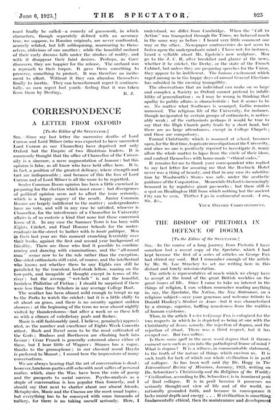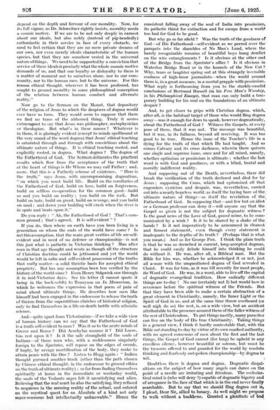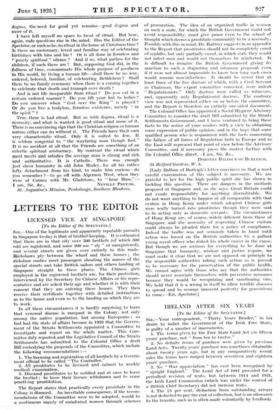THE BISHOP OF PRETORIA IN DEFENCE OF DOGMA [To the
Editor of the SPECTATOR.; the course of a long journey from Pretoria I have somehow lost a recent copy of the Spectator, which I had kept because the first of a series of articles on George Fox had stirred my soul. But I remember enough of the article by Mr. St. Loe Strachey to set me writing here in this distant and lonely mission-station.
The article is representative of much which we clergy have to accept at the hand of the great British weeklies on the great issues of life. Shice I came to take an interest in the things of religion, I can seldom remember reading anything in, say, the Spectator, the Nation, the New Statesman, on a religious subject—save your generous and welcome tribute to Donald Hankey's Student in Arms--but it was characterized by a strange, superior, baffling remoteness from the realities of human existence.
Thus, in the article I refer to George Fox is eulogized for the two respects in which he is depicted as being at one with the Christianity of Jesus, namely, the rejection of dogma, and tlic rejection of ritual. There was a third respect, but it has escaped me. But two suffice.
Is there some spell in the mere word dogma that it throws eminent men such as you into the pathological frame of mind ? What is dogma ? It is a witness, in communicable statement, to the truth of the nature of things which environ us. It is such truth for lack of which our whole civilization is in peril of collapse. As has been well said (by Dr. Hogg in The International Review of Missions, January, 1925, writing on Dr. Schweitzer's Christianity and the Religions of the World): " Civilization, according to Dr. Schweitzer, is in imminent peril of final collapse. It is in peril because it possesses no seriously thought-out view of life and of the world, - no rationally grounded faith, and because in consequence it lacks moral depth and energy . . . If civilization is something fundamentally ethical, then -its maintenance and development
depend on the depth and fervour of our morality. Now, for its full vigour, as Dr. Schweitzer rightly insists, morality needs a cosmic motive. If we are to be not only deeply in earnest about our ideals, but also nobly (instead of pig-headedly) enthusiastic in their service in face of every obstacle, we need to feel certain that they are no mere private dreams of our own, nor even merely ideals characteristic of the human species, but that they are somehow vested in the universal nature of things. We need to be supported by a conviction that service of these ideals is precisely what the whole cosmic motive demands of us, and that our loyalty or disloyalty to them is a matter of moment not to ourselves alone, nor to our com- munity, nor to the human race, but to the universe. For this reason ethical thought, wherever it has been profound, has sought to ground morality in some philosophical conception of the relation between human conduct and alternate reality."
Now go to the Sermon on the Mount, that depository of the religion of Jesus to which the despisers of dogma would ever have us turn. They would seem to suppose that there we find no trace of the abhorred thing. Truly it seems extravagant to say that Jesus was philosopher, metaphysician or theologian. But what's in these names ? Whatever is in them, it is glaringly evident (except to minds spellbound at the very sound of the word dogma) that Jesus' ethical teaching is saturated through and through with convictions about the ultimate nature of things. It is ethical teaching rooted, and explicitly rooted, in dogma. What dogma ? The dogma of
the Fatherhood of God. The Sermon delineates the practical
results which flow from the acceptance of the truth that at the heart of things is He Whom we may call Father ; and, more that this is a Fatherly scheme of existence. " Here is the truth," says Jesus, with uncompromising dogmatism, " on which you must build life. Build on the corollaries of the Fatherhood of God, build on love, build on forgiveness, build on selfless co-operation for the common good—build so and you build on reality ; you build on the rock. But build on hate, build on greed, build on revenge, and you build on sand ; and down your building will crash when the river is in spate and beats upon it."
Do you reply : " Ah, the Fatherhood of God ! That's com- mon ground ; that's agreed. It is self-evident " ?
If you do, then where on earth have you been living in a generation on whom the ends of the world have come ? Is not this assumption, that the main great verities of life are self- evident and in need of no defence or championship—is not this just what is pathetic in Victorian thinking ? Man after man in that age thought and wrote as though all the structure of Christian doctrine could be jettisoned and yet the world would be left in calm and self-evident possession of the truths that really matter—a solid theistic basis for accepted ethical propriety. But has any assumption been less verified by the history of the world since? Even Henry Sidgwick saw through it in mid-Victorian days. See his letter (I cannot quote it being in the back-veldt) to Tennyson on In Memoriam, in which he welcomes the expression in that poem of pain of mind about ultimate things. He describes how men like himself had been engaged in the endeavour to release the truth of theism from the superstitious clutches of historical religion, only to find themselves in a life-or-death battle with atheistic science.
And—quite apart from Victorianism—if we take a wide view of human history can we say that the Fatherhood of God is a truth self-evident to man? Was it so to the acute minds of Greece and Rome ? Did Aeschylus assume it ? Did Lucre.. tius rest upon it ? Is it the safe stronghold of the souls of Indians—of those men who, with a recklessness singularly foreign to the Spectator, will repose on the edges of swords, if haply, by savage mortification of the body, they make to attain peace with the One ? Listen to Hogg again : " Indian thought pursued another track (other than the path chosen by Chinese ethical thought, in the endeavour to ground ethics on the truth of ultimate reality) ; so far from finding themselves spiritually at home in the immediate or workaday world, the souls of the Vedante sages felt it unsatisfying and alien. Believing that the real must be also the satisfying, they refused to acquiesce in the seeming reality of the actual, and entered on the mystical quest for an Absolute of a kind not only super-sensuous but intellectually unknowable." Hence the consistent falling away of the soul of India into pessimism, its pathetic thirst for extinction and for escape from a world too bad for God to be good.
But why go so far afield ? Was the truth of the goodness of God—of His Fatherhood—self-evident as we peered over the parapets into the shambles of No Man's Land, where the barely recognizable remains of beautiful boys hung derelict on the wire entanglements ? Is it obvious at the other end of the Bridge from the Spectator's office ? Is it obvious in Waterloo Bridge Road or in the kennels of the New Cut Why, tears or laughter spring out at this strangely insensible coolness of high-brow journalists—when the world around them is, in a great measure, in a mortal grapple with pessimism. What reply is forthcoming from you to the starkly-candid conclusions of Bertrand Russell (in his Free Man's Worship, in his Philosophical Essays), that man can only build a tem- porary building for his soul on the foundations of an ultimate despair ?
And, to get closer to grips with Christian dogma, which, after all, is the habitual target of those who would fling dogma away—was it enough for Jews to speak, however dogmatically, about the Fatherhood of God ? Witness the Gospels, at every pose of them, that it was not. The message was beautiful, but it was, in its fullness, beyond all receiving. It was too good to be true. Hence the issue of the Teacher's life in a dying for the truth of that which He had taught. And so comes Calvary and its crass darkness, wherein there quivers one single and supreme issue, once and for all raised, namely, whether optimism or pessimism is ultimate ; whether the last word is with God and goodness, or with a blind, brutal and morally indifferent reality.
And supposing out of the Death, nevertheless, there did break the verification of the truth declared and died for by Jesus ; supposing the Cross, which had epitomised all that engenders cynicism and despair, was, nevertheless, carried out into a nearly hopeless world, as itself the laying bare of the ultimate nature of things—as itself the revelation of the , Fatherhood of God. In supposing that—and few but an idiot or a German professor can deny it—will anyone say that the Gospel so given is not the subject for dogmatic witness ? Is the good news of the Love of God, quand meme, to be com- municated by a wink ? Is it to be shared by a shake of the , hands ? Is it not imperatively to be announced in clearest and firmest statement, even though every statement is inadequate to the depths of its truth ? (Perhaps that is what you mean.) And as for George Fox. I think the plain truth is that he was so drenched in current, long-accepted dogmas, that he could easily delude himself into thinking he could do without it. He was, after all, a Biblical man. But the Bible for him was, whether he acknowledged it or not, just all a-ooze with the unquestioned dogma of God revealed in Christ. It was for him, as it was till recently for most people, the Word of God. He was, in a word, able to live off the capital of dogmatic evangelical tradition. How radically different things are to-day ! No one (certainly not I) but would bow in reverence before the spiritual witness of the Friends. But that they have been able to make a certain abstraction of a great element in Christianity, namely, the Inner Light or the Spirit of God in us, and at the same time throw overboard (or well nigh do so) the rest, is, on a wide view, but an accident attributable to the presence assured them of the fuller witness of
the rest of Christendom. To put things nastily, many parasites can live on the body of His true Christianity. Taking things in a general view, I think it hardly contestable that, with the Bible not standing to-day by virtue of its own marked authority, with no agreed consensus of men about the first and the last things, the Gospel of God cannot (for long) be upheld in any creedless silence, however beautiful or solemn, but must be the treasure offered to and guarded for the world by resolute thinking and fearlessly outspoken championship—by dogma to wit.
Doubtless there is dogma and dogma. Dogmatic disqui- sitions on, the subject of how many angels can dance on the
point of a needle are irritating and frivolous. The ecclesias.
tical mind is (who will deny ?) capable of dogmatic bigotry and of arrogance in the face of that which is in the end never finally searchable. But to say that we should fling dogma out is, I plead, Dear Sir, allied to lunacy. As well might we propose to walk without a backbone. Granted a plenitude of bad
dogma, the need for good yet remains—good dogma and more of it.
I have left myself no space to treat of ritual. But here, again, rude questions rise in the mind. Has the Editor of the Spectator, or such as he, no ritual in the home at Christmastime ? Is there no customary, loved and familiar way of celebrating birthdays with him and his ? Or is all done in formless and " purely spiritual " silence ? And if so, what pathos for the children, if such there are ! But, supposing God did, in the fullness of time, consummate His whole purpose of goodness ' in His world, by living a human life—shall there be no way, ordered, beloved, familiar, of celebrating Bethlehem ? Shall there be no family ceremony when there is a coming together to celebrate that death and triumph over death ?
And is not life inseparable from ritual ? Do you eat in a certain ordered manner ? Do you lift your hat to ladies ? Do you uncover when " God save the King " is played ? Or do you live a bodyless, formless existence, merely " in the spirit " ?
True, there is bad ritual. But as with dogma, ritual is a necessity, and what is wanted is good ritual and more of it. There is no convincing sign that the Christian religion or human nature either can do without it. The Friends have their own very characteristic ritual. Only it is suited to few. It is seldom congenial to " the wayfaring man though fool." It is no accident at all that the Friends are something of an eclectic spiritual aristocracy. By contrast the ritual which TWA meets and satisfies the average man is strong and rich and authoritative. It is Catholic. There was enough just sheer humanity in old John Morley, for all his rather lofty detachment from his kind, to make him curious—do you remember ?—to go off with Algernon West, when they were at Cannes with Mr. Gladstone, to " hear Mass."—
















































 Previous page
Previous page